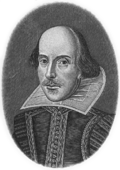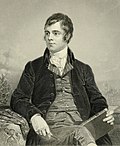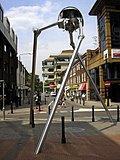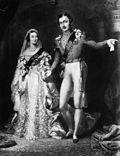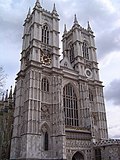
Back بوابة:المملكة المتحدة Arabic Portal:Böyük Britaniya Azerbaijani প্রবেশদ্বার:যুক্তরাজ্য Bengali/Bangla دەروازە:شانشینی یەکگرتوو CKB Portál:Spojené království Czech Portal:Vereinigtes Königreich German Portal:Qraliya Yewbiyayiye DIQ Portal:Reino Unido Spanish درگاه:بریتانیا Persian Portail:Royaume-Uni French
The United Kingdom Portal
 |
 |
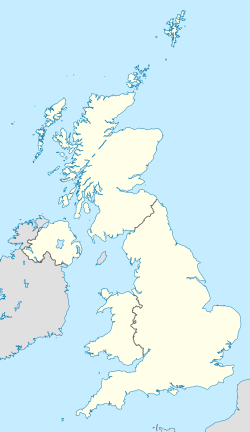
| |
The United Kingdom of Great Britain and Northern Ireland, commonly known as the United Kingdom (UK) or Britain, is a country in Northwestern Europe, off the coast of the continental mainland. It comprises England, Scotland, Wales and Northern Ireland. The UK includes the island of Great Britain, the north-eastern part of the island of Ireland, and most of the smaller islands within the British Isles, covering 94,354 square miles (244,376 km2). Northern Ireland shares a land border with the Republic of Ireland; otherwise, the UK is surrounded by the Atlantic Ocean, the North Sea, the English Channel, the Celtic Sea and the Irish Sea. It maintains sovereignty over the British Overseas Territories, which are located across various oceans and seas globally. The UK had an estimated population of over 68.2 million people in 2023. The capital and largest city of both England and the UK is London. The cities of Edinburgh, Cardiff and Belfast are the national capitals of Scotland, Wales and Northern Ireland.
The UK has been inhabited continuously since the Neolithic. In AD 43 the Roman conquest of Britain began; the Roman departure was followed by Anglo-Saxon settlement. In 1066 the Normans conquered England. With the end of the Wars of the Roses the Kingdom of England stabilised and began to grow in power, resulting by the 16th century in the annexation of Wales and the establishment of the British Empire. Over the course of the 17th century the role of the British monarchy was reduced, particularly as a result of the English Civil War. In 1707 the Kingdom of England and the Kingdom of Scotland united under the Treaty of Union to create the Kingdom of Great Britain. In the Georgian era the office of prime minister became established. The Acts of Union 1800 incorporated the Kingdom of Ireland to create the United Kingdom of Great Britain and Ireland in 1801. Most of Ireland seceded from the UK in 1922 as the Irish Free State, and the Royal and Parliamentary Titles Act 1927 created the present United Kingdom.
The UK became the first industrialised country and was the world's foremost power for the majority of the 19th and early 20th centuries, particularly during the Pax Britannica between 1815 and 1914. The British Empire was the leading economic power for most of the 19th century, a position supported by its agricultural prosperity, its role as a dominant trading nation, a massive industrial capacity, significant technological achievements, and the rise of 19th-century London as the world's principal financial centre. At its height in the 1920s the empire encompassed almost a quarter of the world's landmass and population, and was the largest empire in history. However, its involvement in the First World War and the Second World War damaged Britain's economic power, and a global wave of decolonisation led to the independence of most British colonies. (Full article...)
Featured article
The Gunpowder Plot of 1605 was a failed assassination attempt against King James I of England and VI of Scotland by a group of provincial English Catholics led by Sir Robert Catesby. The plan was to blow up the House of Lords during the State Opening of Parliament on 5 November, as the prelude to a popular revolt in the Midlands during which James's nine-year-old daughter, Princess Elizabeth, was to be installed as the Catholic head of state. Catesby may have embarked on the scheme after hopes of securing greater religious tolerance under King James had faded, leaving many English Catholics disappointed. His fellow plotters were John Wright, Thomas Wintour, Thomas Percy, Guy Fawkes, Robert Keyes, Thomas Bates, Robert Wintour, Christopher Wright, John Grant, Sir Ambrose Rookwood, Sir Everard Digby and Francis Tresham. Fawkes, who had 10 years of military experience fighting in the Spanish Netherlands in suppression of the Dutch Revolt, was given charge of the explosives. (Full article...)
Featured biography
Ronald Niel Stuart (1886–1954) was a British Merchant Navy commodore and Royal Navy captain who was highly commended following extensive and distinguished service at sea over a period of more than 35 years. During World War I he received the Victoria Cross, the Distinguished Service Order, the French Croix de Guerre avec Palmes and the United States' Navy Cross for a series of daring operations he conducted while serving in the Royal Navy during the First Battle of the Atlantic. Stuart's Victoria Cross was awarded following a ballot by the men under his command. This unusual method of selection was used after the Admiralty Board was unable to choose which members of the crew deserved the honour after a desperate engagement between a Q-ship and a German submarine off the Irish coast. His later career included command of the liner RMS Empress of Britain and the management of the London office of a major transatlantic shipping company. Following his retirement in 1951, Stuart moved into his sister's cottage in Kent and died three years later. A sometimes irascible man, he was reportedly embarrassed by any fuss surrounding his celebrity and was known to exclaim "Mush!" at any demonstration of strong emotion. (Full article...)
General images -
Subportals
WikiProjects
Things you can do
- Visit the British Wikipedians' notice board.
- The noticeboard is the central forum for information and discussion on editing related to the United Kingdom.
- Comment at the British deletion sorting page.
- This page lists deletion discussions on topics relating to the United Kingdom.
Featured pictures
Did you know -

- ... that the 1st Armoured Division of the British Army chose a white rhinoceros on a black oval as their insignia?
- ... that before Fred Thomas became an MP, he was the Royal Marines' light heavyweight boxing champion?
- ... that Joanna Cherry showed a printed copy of an Internet meme featuring Lily Hoshikawa during a UK parliamentary committee meeting?
- ... that New Zealand composer Maewa Kaihau sold her rights to the song "Now is the Hour" for £10, a decade before it became a hit in the United Kingdom and United States?
- ... that Southern Water was fined £90 million for deliberately dumping sewage into the sea?
- ... that Surinder Singh Bakhshi led the successful containment of smallpox in the community during Birmingham's smallpox outbreak in 1978?
In the news
- 23 June 2025 – Gaza war protests
- The United Kingdom announces it will ban the direct action protest network Palestine Action on anti-terrorism grounds after the group broke into the RAF Brize Norton base and vandalized two planes. (AP)
- 20 June 2025 – Middle Eastern crisis
- Iranian foreign minister Abbas Araghchi meets with the foreign ministers of the United Kingdom, Germany, France and European Union in Geneva for talks about its nuclear program. (AP)
- 20 June 2025 –
- The United Kingdom parliament votes to approve a bill allowing terminally ill adults to voluntarily end their lives, moving towards legalizing assisted suicide in England and Wales. (DW) (BBC News)
- 10 June 2025 – Fossil fuel phase-out
- The British government announces it will invest £14.2 billion (US$19 billion) to construct the new Sizewell C nuclear power station in Suffolk, England, to reduce the country's reliance on fossil fuels. (AP) (Reuters)
- 10 June 2025 – War crimes in the Gaza war, Gaza humanitarian crisis
- The United Kingdom, Canada, Australia, New Zealand, and Norway impose sanctions on Israeli far-right ministers Bezalel Smotrich and Itamar Ben-Gvir, including asset freezes and travel bans, due to their conduct during the Gaza war. (Reuters)
- 9 June 2025 – Israeli blockade of the Gaza Strip
- The Israeli Navy seizes the June 2025 Gaza Freedom Flotilla's flagship vessel, the United Kingdom-flagged Madleen, and takes its occupants (including Swedish activist Greta Thunberg and MEP Rima Hassan) to Israel. The humanitarian aid the ship was carrying en route to Gaza will still be sent into Gaza. (The Times of Israel)(CNN) (The Guardian)
Categories
Other UK-connected Wikipedias
Wikimedia
The following Wikimedia Foundation sister projects provide more on this subject:
-
Commons
Free media repository -
Wikibooks
Free textbooks and manuals -
Wikidata
Free knowledge base -
Wikinews
Free-content news -
Wikiquote
Collection of quotations -
Wikisource
Free-content library -
Wikiversity
Free learning tools -
Wikivoyage
Free travel guide -
Wiktionary
Dictionary and thesaurus
© MMXXIII Rich X Search. We shall prevail. All rights reserved. Rich X Search

































